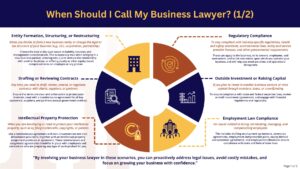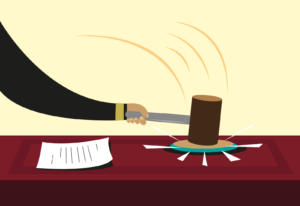Legal advice versus business advice
People hire lawyers to give them legal advice. Sometimes, people also hire lawyers to give them business advice. This may introduce thorny considerations because lawyers generally should not give business advice (more on that below). However, sometimes they can, and do (more on that too).
As a business lawyer who is often asked for both legal advice and business advice, I have some thoughts on the topic.
The meaning of legal advice and business advice
I’m not aware of any authoritative definition for “legal advice” or “business advice.” Courts have certainly struggled with it.
To keep it simple, I would define “legal advice” as advice on the legal implications of a situation or a potential business decision. For example, if a client asks about the implications of a contract’s indemnification clause, or the proper way to perfect a security interest, they are generally asking for legal advice.
I would define “business advice” as advice on the pros and cons of strategic or operating decisions. For example, if a client asks about whether to sell off business assets at a particular point in time, or whether to expand operations to another jurisdiction, they are generally asking for business advice.
Close readers may have observed that I used the qualifier “generally” twice above. This is because the line between legal advice and business advice (and “legal risk” and “business risk”) can be fuzzy. People will often say “that’s legal advice” or “that’s business advice” to pass the buck on a decision, or because they simply don’t feel qualified to opine on a topic.
Often, I get the question “what would you do if you were me?” I like asking that question to other professional people – doctor, mechanic, whomever, but I don’t always enjoy being on the receiving end.
The professional’s role is to understand and articulate the technical framework, the range of potential outcomes of any course of action, and the probabilities of each outcome. However, someone else needs to make a business decision after all of this is explained, and to accept some degree of risk and responsibility. We call that person “the client.”
Can lawyers give business advice?
The answer depends on many things, starting with the lawyer’s role. If the lawyer is in-house at a company, it may be in the lawyer’s job description to give strategic and business advice. Especially if all or part of that person’s title is “General Counsel”, and they are acting in that capacity (rather than acting as Corporate Secretary, for example).
If the lawyer is like me, and works as outside counsel to many different businesses — including closely-held businesses — giving business advice is almost never part of the gig. But this is where the lawyer and client need to pay close attention to the scope of work set forth in the relevant law firm engagement letter. Typically, the scope of work in that contract between attorney and client will only cover legal advice.
Regardless of what an engagement letter says, the reality is that clients often expect lawyers to make business decisions for them. In some cases, this is because a client will view those decisions, incorrectly, as legal decisions. Again, the line is often fuzzy, but suffice it to say that business decisions concern strategic and operating concerns, and often incorporate legal advice and other factors.
The rules of professional conduct for attorneys in many states (most states?) don’t provide much guidance on whether a lawyer must completely steer clear of business advice. However, ABA Model Rule 2.1[2] provides:
“Advice couched in narrow legal terms may be of little value to a client, especially where practical considerations, such as cost or effects on other people, are predominant. Purely technical legal advice, therefore, can sometimes be inadequate.”
I couldn’t agree more. The goal is to help people. Lawyers are expensive and should add as much value as possible. To accomplish this, the question is whether the lawyer should veer into the lane of giving business advice.
Risks of giving (and taking) business advice
Many lawyers shy away from giving business advice for one compelling, practical reason: the lawyer does not want the client to blame them when things don’t pan out.
Another practical reason for lawyers to avoid giving business advice is client protection. Setting aside the unfortunate fact that lawyers often don’t understand the business issues relevant to their clients, business advice may not be protected by the attorney-client privilege. As a general rule, the attorney-client privilege applies only if the parties are giving and receiving legal advice, and if those communications are given in confidence.
In addition, ABA Model Rule 1.1, mirrored to some degree in all states, provides that “a lawyer shall provide competent representation to a client. Competent representation requires the legal knowledge, skill, thoroughness and preparation reasonably necessary for the representation.” If a lawyer does not have that level of competence, they must associate with another lawyer who does, or refer the client out.
This rule applies to legal advice, but the same is true of any advice a lawyer imparts to a client – including business advice! To that end, ABA Model Rule 2.1[4] provides:
“Matters that go beyond strictly legal questions may also be in the domain of another profession…Where consultation with a professional in another field is itself something a competent lawyer would recommend, the lawyer should make such a recommendation. At the same time, a lawyer’s advice at its best often consists of recommending a course of action in the face of conflicting recommendations of experts.”
This a rule for lawyers, but clients should also keep it in mind. Bad advice is bad advice, no matter who it comes from.
Benefits of giving (and taking) business advice
Clients will solicit a lawyer’s advice on business decisions, because clients always look for value. The client presumes that their lawyer has helped many other clients in similar situations. Therefore, the lawyer should be able to provide value beyond a sterile legal analysis.
Even if a business lawyer is not obliged to make business decisions for a client, in many cases it makes sense for the lawyer to shepherd the client toward a reasonable business decision. A seasoned lawyer will have valuable experience and expertise in the field, after all. Sometimes, this experience is centered on a specific industry, and the lawyer’s trade knowledge may rival that of experienced business operators.
I often qualify the advice I give clients by saying something like “I’ve given you the legal framework and you are asking me what to do. This means you’re asking for business advice. I didn’t go to school for that, but here are some thoughts to take or leave.” If this type of advice is within the scope of services, and the client understands the decision-making parameters, hopefully I’ve added some value.
Legal advice and business advice: wrapping up
Clients should look for lawyers who add value, and lawyers should look to add value to clients. The act of giving solid (and even creative) legal advice can add a lot of value. In the right context, business advice from a lawyer can also add value.
In many cases, it’s worth noting that the adequacy of any advice—business or legal—depends in part on the sophistication of the client. That’s true no matter how “correct” the advice may be. Other important factors include how clearly the client has communicated an issue to a lawyer, and how skillfully the lawyer has extracted information needed to opine on a question presented.
If a client is working with a lawyer, the client is entitled to rely upon that professional’s legal advice. The client should also feel free to ask the lawyer for business advice, unless the parties’ engagement letter precludes it. Whether the lawyer should give that advice, and whether the client should rely on it, is another matter entirely.

























